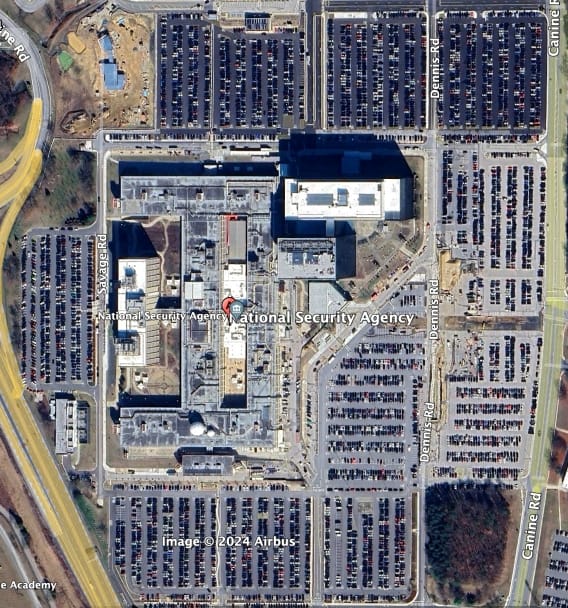Memorial Day Birthday: No-Such-Agency Turns 65

One day before Memorial Day and with little fanfare, on May 29, 1959, President Eisenhower signed into law the National Security Agency Act. It's been spying on foreigners, and Americans, ever since.
Thirty-three days after my 18th birthday, I raised my right hand and took an oath to preserve, protect, and defend the Constitution of the United States against all enemies, foreign and domestic. I come from a line of citizen-soldiers stretching back at least to my grandfather Earl Eddington, who nearly died from wounds he received in WW I.
My view of the oath and the responsibilities that come with it is that we can't preserve the freedoms that my grandfather, father, brother, and I served to protect by simultaneously sanctioning actions that have the effect of undermining those same freedoms. You can imagine, then, how I felt when I discovered that America's most celebrated soldier and 34th chief executive had signed into law the creation of a government agency that's been implicated in constitutional rights violations at scale at multiple points in our history.
If you were to go to the Congressional Record and look for evidence of a debate on the creation of the National Security Agency (NSA), you wouldn't find much of anything. I know because I've done exactly that as part of the research for my forthcoming book, The Triumph of Fear (out in March 2025 from Georgetown University Press). The Congress.gov entry for the actual authorizing statute (PL 86-36) is also quite sparse. I suppose in a way that's not terribly surprising, given the times (Cold War + Red Scare on steroids).
But in the 65 years since its creation--merging Army and Navy signals intelligence components into one national-level electronic spying agency--NSA has certainly had its share of successes and scandals.
A belated success was the partial decryption of a Soviet cipher, under the NSA code name VENONA, that helped uncover a major Soviet nuclear espionage ring, implicating, among others, Julius and Ethel Rosenberg. The VENONA cipher breakthrough was considered so sensitive that in pursuing the Rosenbergs the federal government elected not to use the material in the subsequent espionage case against the couple, relying instead on the testimony of others involved in the spy ring who gave up the Rosenbergs as being key players in the espionage. Only decades later would the VENONA program be made public--partially--by NSA.
Another key Cold War episode NSA contributed to was helping unravel the mystery surrounding the Soviet shootdown of Korean Airlines Flight 007 in September 1983. NSA intercepts showed that the Soviets genuinely believed that the airliner was in fact on a spy mission over the Sakhalin Islands. It wasn't, but NSA's intercepts no doubt helped President Reagan manage the crisis and prevent it from escalating into an even larger tragedy.
More recently, NSA has gained press and Congressional attention for all the wrong reasons.
The very first story in June 2013 featuring material spirited out of NSA systems by contractor-turned-whistleblower Edward Snowden sparked a fresh debate over the scope of NSA surveillance, much of it accomplished with the help--willing or otherwise--of the major telecommunications firms. Beyond attacking Snowden for his revelations, Congress passed a largely useless "reform" bill in response, the Orwellian-named USA Freedom Act, which ultimately did nothing to rein in NSA collection of Americans' data before being shut down by NSA in 2019.
As readers of the Sentinel no doubt recall, it was just last month that the battle between privacy and civil liberties advocates versus supporters of aggressive electronic surveillance powers came to a victorious end for the latter. The NSA-run Foreign Intelligence Surveillance Act (FISA) Section 702 program was reauthorized with expanded targeting powers for NSA, albeit this time for only two years vice the usual five years as was the case in 2012 and 2018.
One of the key reasons the public doesn't learn until long after the fact how ineffectual many of these programs have been in actually stopping terrorist attacks on America--the original post/9-11 rationale for all such NSA programs--is that the NSA Act of 1959 gives the agency unbelievably sweeping powers to hide pretty much anything from you, me, and everybody else--even if it involves programmatic failures, cost overruns, etc.
Here's the operative language from Section 6 of the NSA Act of 1959 that makes such secrecy possible:
Except as provided in subsection (b) of this section, nothing in this Act or any other law (including, but not limited to, the first section and section 2 of the Act of August 28, 1935 (5 U.S.C. 654)) shall be construed to require the disclosure of the organization or any function of the National Security Agency, of any information with respect to the activities thereof, or of the names, titles, salaries, or number of the persons employed by such agency.
I don't actually have a problem with NSA keeping the names of rank-and-file employees out of the public domain because I understand the potential counterintelligence risk of having that kind of data readily publicly available.
But there's simply no justification for allowing NSA to keep "any information with respect to the activities" of the agency from the public when it involves allegations of waste, fraud, abuse, mismanagement, or even criminal conduct. Yet the plain language of the statute allows NSA officials to do exactly that, a situation that's intolerable from a "good government" standpoint. Changing that situation, most likely through an amendment to the Freedom of Information Act, remains one of my highest public policy priorities.
Thanks for reading the Sentinel. If you're not currently a subscriber, please consider becoming one as doing so is free through 2024 and it's an easy way to show your support for my work. Also, please share this piece with family, friends, and anyone else you believe would benefit from reading it.





